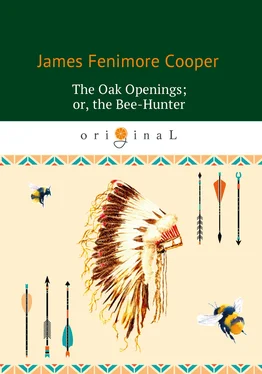It might have been by means of a secret sympathy, or it was possibly the result of accident, but certain it is, that the Chippewa was placed in that of le Bourdon. As for Whiskey Centre, he lay like a log in the bottom of his own light bark, cared for only by his affectionate wife, who had made a pillow for his head; but, fortunately, if no assistance just then, not any material hindrance to the movements of his friends. By the time le Bourdon and the Chippewa had got their stations, and the canoes were free of the bottom, it was evident by the sounds, that not only the dogs, but divers of their masters, had floundered through the swamp, and were already on the firm ground east of it. As the dogs ran by scent, little doubt remained of their soon leading the savages to the place of embarkation. Aware of this, the bee-hunter directed the Chippewa to follow, and urged his own canoe away from the shore, following one of three of the natural channels that united just at that point.
The clamor now sensibly increased, and the approach of the pursuers was much faster than it had previously been, in consequence of there no longer being wet land beneath their feet. At the distance of fifty yards from the shore, however, the channel, or open avenue among the rice-plants that the canoes had taken, made a short turn to the northward; for all the events we have just been recording occurred on the northern, or leeward side of the river. Once around this bend in the channel, the canoes would have been effectually concealed from those on the beach, had it even been broad daylight, and, of course, were so much more hidden from view under the obscurity of a very dark night. Perceiving this, and fearful that the dip of the paddles might be heard, le Bourdon ceased to urge his canoe through the water, telling the Chippewa to imitate his example, and let the boats drift. In consequence of this precaution the fugitives were still quite near the shore when, first, the dogs, then a party of their masters, came rushing down to the very spot whence the canoes had departed scarcely two minutes before. As no precautions were taken to conceal the advance of the pursuers, the pursued, or the individuals among them who alone understood the common language of the great Ojebway nation well, had an opportunity of hearing and understanding all that was said. Le Bourdon had brought the two canoes together; and the Chippewa, at his request, now translated such parts of the discourse of their enemies as he deemed worthy of communicating to the females.
“Say, now, nobody dere!” commenced the Indian, coolly. “T’ink he no great way off – mean to look for him – t’ink dog uneasy – won’er why dog so uneasy.”
“Them dogs are very likely to scent us here in the canoes, we are so near them,” whispered le Bourdon.
“S’pose he do, can’t catch us,” coolly answered the Chippewa – “beside, shoot him, don’t take care – bad for dog to chase warrior too much.”
“There is one speaking now, who seems to have authority.”
“Yes – he chief – know he voice – hear him too often – he mean to put Pigeonswing to torture. Well, let him catch Pigeonswing fust – swift bird do that, eh?”
“But what says he? – it may be of importance to learn what the chief says, just now.”
“Who care what he say – can’t do nuttin’ – if get good chance, take HIS scalp, too.”
“Aye, that I dare say – but he is speaking earnestly and in a low voice; listen, and let us know what he says. I do not well understand at this distance.”
The Chippewa complied, and maintained an attentive silence until the chief ceased to speak. Then he rendered what had been said into such English as he could command, accompanying the translation by the explanations that naturally suggested themselves to one like himself.
“Chief talk to young men,” said the Chippewa – “all chief talk to young men – tell him dat Pigeonswing must get off in canoe – don’t see canoe, nudder – but, muss be canoe, else he swim. T’ink more than one Injin here – don’t know, dough – maybe, maybe not – can’t tell, till see trail, morrow morning – ”
“Well, well; but what does he tell his young men to DO?” demanded the bee-hunter, impatiently.
“Don’t be squaw, Bourdon – tell all by’em bye. Tell young men s’pose he get canoe, den he may get OUR canoe, and carry ‘em off – s’pose he swim; dat Chippewa devil swim down stream and get OUR canoe dat fashion – bess go back, some of you, and see arter OUR canoe – dat what he tell young men most.”
“That is a lucky thought!” exclaimed le Bourdon – “let us paddle down, at once, and seize all their canoes before they can get there. The distance by water, owing to this bend in the river, is not half as great as that by land, and the marsh will double the distance to them.”
“Dat good counsel,” said Pigeonswing – “you go – I follow.”
This was no sooner said, than the canoes again got in motion. The darkness might now have been a sufficient protection had there been no rice, but the plant would have concealed the movement, even at noon-day. The fire in the hut served as a beacon, and enabled le Bourdon to find the canoes. When he reached the landing, he could still hear the dogs barking on the marsh, and the voices of those with them, calling in loud tones to two of the savages who had remained at the chiente, as a sort of camp-guard.
“What do them chaps say?” asked le Bourdon of the Chippewa. “They yell as if striving to make the two men at the door of the hut hear them. Can you make out what they are bawling so loud?”
“Tell two warrior to come down and take care of canoe – dat all – let ‘em come – find two here to take care of DEM – got good scalp, them two rascal Pottawattamie!”
“No – no – Pigeonswing – we must have no more of that work to-night, but must set about towing these four canoes off the shore as fast as we can. Have you got hitches on your two?”
“Fast ‘nough – so fast, he follow,” answered the Indian, who, notwithstanding his preparations to help to remove the canoes, was manifestly reluctant to depart without striking another blow at his enemies. “Now good time for dem rascal to lose scalp!”
“Them rascals, as you call them, begin to understand their friends in the marsh, and are looking to the priming of their rifles. We must be moving, or they may see us, and give us a shot. Shove off, Chippewa, and paddle at once for the middle of the bay.”
As le Bourdon was much in earnest, Pigeonswing was fain to comply. Had the last possessed a rifle of his own, or even a knife, it is highly probable he would have leaped ashore, and found the means of stealing on some of his enemies unawares, and thus secured another trophy. But the bee-hunter was determined, and the Chippewa, however reluctant, was compelled to obey; for not only had le Bourdon kept his rifle at his side, but he had used the precaution of securing his knife and tomahawk, both of which he carried habitually, the same as a red man.
The canoes had now a somewhat difficult task. The wind still blew fresh, and it was necessary for one of these light craft, pretty well loaded with its proper freight, and paddled by only a single person, to tow two other craft of equal size dead to the windward. The weight in the towing craft, and the lightness of those that were towed, rendered this task, however, easier than it might otherwise have proved. In the course of a couple of minutes all the canoes were far enough from the shore to be out of sight of the two Indians, who, by that time, had got down to the beach to look after their own craft. The yell these savages raised on finding themselves too late, not only announced their disappointment, but communicated the extent of the disaster to their friends, who were still floundering through the marsh.
Читать дальше












